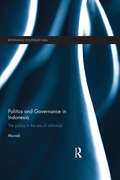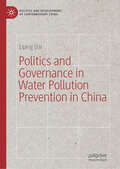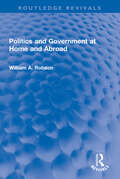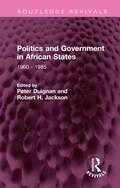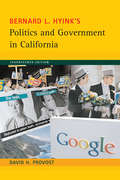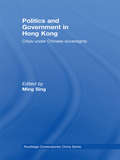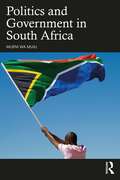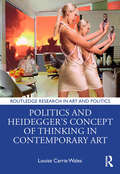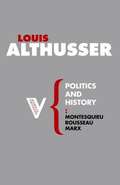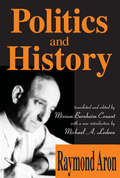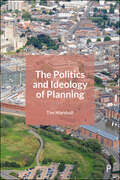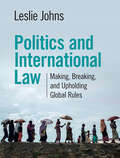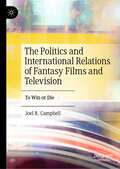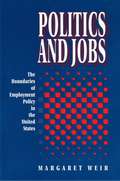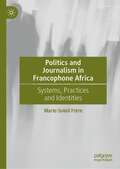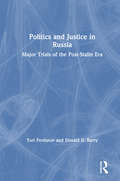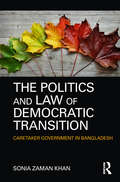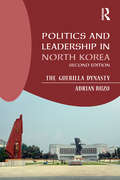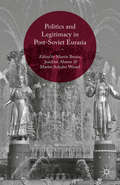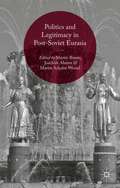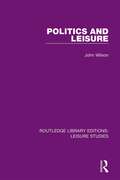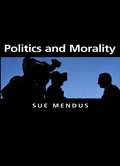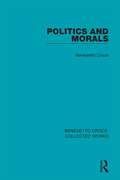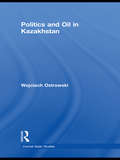- Table View
- List View
Politics and Governance in Indonesia: The Police in the Era of Reformasi (Rethinking Southeast Asia)
by MuradiHow does an authoritarian state reform its police force following a transition to democracy? In 1998, Indonesia, the third largest country in the world, faced just such a challenge. Policing had long been managed under the jurisdiction of the military, as an instrument of the Suharto regime – and with Suharto abruptly removed from office, this was about to change. Here we see how it changed, and how far these changes were for the better. Based on direct observations by a scholar who was involved in the last days of the New Order and who saw how the police responded to regime change, this book examines the police, the new regime, and how the police was disassociated from the military in Indonesia. Providing a comprehensive historical overview of the position of police in this change of regime, the book focuses on two key areas: the differences between local and national levels, and the politicisation associated with decentralisation. Arguing that the disassociation of the Indonesian National Police from the military has achieved only limited success, the book contends that there is continued impetus for the establishment of a professional police force and modern and democratic policing, which will entail effective public control of the police. A pioneering study of the police in Indonesia, examining key issues in the post-Suharto era, this book will be of interest to scholars of Southeast Asian politics and of policing and politics in the developing world.
Politics and Governance in Water Pollution Prevention in China (Politics And Development Of Contemporary China Series)
by Liping DaiThis book applies an interdisciplinary governance assessment framework to assess China’s water quality governance from a holistic point of view. The project explores China’s water quality status, water policy discourses, water regulations, public participation in water governance, the path towards green water law, eco-compensation approach in water quality management and the implementation mechanism for achieving water goals. It will appeal to academics in water law, researchers and practitioners dealing with water management, as well as a general audience interested in water issues.
Politics and Government at Home and Abroad (Routledge Revivals)
by William A. RobsonFirst Published in 1967, Politics and Government at Home and Abroad presents William A. Robson’s penetrating observations on the basic requirements of democratic politics and government. Divided into two parts the essays cover a wide field. Part I deals with the fundamental questions of political thought such as relation between freedom, equality, and socialism; education and democracy, and the basic issues of practical government like reform of the British government; and the future of public administration. Part II of the book brings travelogue essays with author’s reflections on India, America, and Russia. This book is an essential read for students and researchers of political science and public administration.
Politics and Government in African States: 1960 - 1985 (Routledge Revivals)
by Peter Duignan Robert H. JacksonOriginally published in 1986, Politics and Government in African States 1960-1985 deals with the politics of sub-Saharan African states since independence. Each chapter considers the formal structure of government at the time of independence and traces the subsequent changes. Each chapter also describes the development of the state machinery, the civil service, the parastatals, defence and police forces, party structure, the political opposition and trade unions. The economics of African states are dealt with insofar as they affect politics and government.
Politics and Government in California
by Bernard Hyink David ProvostPolitics and Government in California is an even-handed, comprehensive account of the organization and function of California state and local governments.Focusing on how state and local governments can most effectively address the challenges facing California today, the Seventeenth Edition is thoroughly updated to include the most recent data and events.
Politics and Government in Hong Kong: Crisis under Chinese sovereignty (Routledge Contemporary China Series #Vol. 34)
by Ming SingThis book examines the government of Hong Kong since its handover to mainland China in 1997, focusing in particular on the anti-government mass protests and mobilisations in the years since 2003. It argues that Hong Kong has been poorly governed since transferring to Chinese rule, and that public frustration with governmental performance, including anti-subversion laws and slow democratisation, has resulted in the regular and massive protests, which have been rare in Hong Kong's past political development. The book then assesses different explanations for Hong Kong's government problems, including lack of social cohesion, incomplete economic restructuring, structural budgetary deficit, severe social inequality, intensifying cronyism and deficiencies within the political system itself. It goes on to discuss the implications of poor governance for legislative elections, civil society and constitutional development, and considers the prospects for the future. It argues that although in the short-term the Hong Kong government has managed to maintain its popular support ratings, in the longer run it is unlikely to be able to maintain its legitimacy in dealing with the fundamental challenges of government unless the current system is replaced by popular election of the government with appropriate institutional capacity and political powers.
Politics and Government in South Africa
by Mueni Wa MuiuPolitics and Government in South Africa introduces readers to all aspects of government and politics in South Africa, from local, to provincial, national, and on to international considerations. The perfect guide for students and general readers, this textbook explains how South Africa’s key institutions are governed and interact with each other, and how important issues such as economics, gender, race, and class shape relations between citizens and government. Grounded in history and leading theories and debates, the book also brings in alternative perspectives from artists, writers, and popular culture, to demonstrate the diverse ways in which issues of politics and social justice are engaged with within South Africa. Written with the needs of students at the forefront, each chapter includes: Review and discussion questions Key terms and further resources Fun facts in a Did you know? section Supplementary sources and quotations in a The Past as Present section Interactive and engaging, Politics and Government in South Africa invites readers to consider what they would do in tackling issues such as land distribution, peacekeeping, South Africa’s role in the African Union, and military engagement abroad. It is an essential read for undergraduate students studying Political Science, International Relations, and African Studies, and for anyone looking to develop a deeper understanding of South Africa.
Politics and Heidegger’s Concept of Thinking in Contemporary Art (Routledge Research in Art and Politics)
by Louise Carrie WalesResponding to Heidegger’s stark warnings concerning the essence of technology, this book demonstrates art’s capacity to emancipate the life-world from globalized technological enframing. Louise Carrie Wales presents the work of five contemporary artists – Martha Rosler, Christian Boltanski, Krzysztof Wodiczko, and collaborators Noorafshan Mirza and Brad Butler – who challenge our thinking and compel a dramatic re-positioning of social norms and hidden beliefs. The through-line is rooted in Heidegger’s question posed at the conclusion of his technology essay as understood through artworks that provides a counter to enframing while using increasingly sophisticated technological methods. The themes are political in nature and continue to have profound resonance in today’s geopolitical climate. The book will be of interest to scholars working in art history, aesthetics, philosophy, and visual culture.
Politics and Heidegger’s Concept of Thinking in Contemporary Art (Routledge Research in Art and Politics)
by Louise Carrie WalesResponding to Heidegger’s stark warnings concerning the essence of technology, this book demonstrates art’s capacity to emancipate the life-world from globalized technological enframing. Louise Carrie Wales presents the work of five contemporary artists – Martha Rosler, Christian Boltanski, Krzysztof Wodiczko, and collaborators Noorafshan Mirza and Brad Butler – who challenge our thinking and compel a dramatic re-positioning of social norms and hidden beliefs. The through-line is rooted in Heidegger’s question posed at the conclusion of his technology essay as understood through artworks that provides a counter to enframing while using increasingly sophisticated technological methods. The themes are political in nature and continue to have profound resonance in today’s geopolitical climate. The book will be of interest to scholars working in art history, aesthetics, philosophy, and visual culture.
Politics and History: Montesquieu, Rousseau, Marx
by Louis Althusser Ben BrewsterIn the first two essays of this book, Louis Althusser analyses the work of two of the greatest thinkers of the Enlightenment – Montesquieu and Rousseau. He shows that although they made considerable advances towards establishing a science of politics, particularly in comparison with the theorists of natural law, they nevertheless remained the victims of the ideologies of their day and class. Montesquieu accepted as given the political notions current in French absolutism; Rousseau attempted to impose by moral conversion an already outdated mode of production. The third essay examines Marx's relationship to Hegel and elaborates on the discussions of this theme in Althusser's earlier books, For Marx and Lenin and Philosophy. Althusser argues that Marx was able to establish a theory of historical materialism and the possibility of a Marxist philosophy of dialectical materialism not simply by turning his back on Hegel, but by extracting and converting certain categories from Hegel's Logic and applying them to English political economy and French socialist political theory.
Politics and History
by Ron ChristensonRaymond Aron, French scholar, journalist, philosopher, sociologist, and historian, is internationally recognized as one of the great thinkers in the modern social sciences, bringing to contemporary history the insights of both philosophy and social science. This edition focuses on Aron's lifelong attempt to bridge the gap between knowledge and action and to understand the dialectical relationship between history and politics. It is an indispensable introduction to one of the most important thinkers of our century.This volume also contains an introduction by Aron, which presents an autobiographical account of his confrontation with many of the most important ideas of this century. Miriam Bernheim Conant provides perceptive commentary as well as a chronology of Aron's career and works.
The Politics and Ideology of Planning
by Tim MarshallPlanning is a battleground of ideas and interests, perhaps more visibly and continuously than ever before in the UK. These battles play out nationally and at every level, from cities to the smallest neighbourhoods. Marshall goes to the root of current planning models and exposes who is acting for what purposes across these battlegrounds. He examines the ideological structuring of planning and the interplay of political forces which act out conflicting interest positions. This book discusses how structures of planning can be improved and explores how we can generate more effective political engagements in the future.
Politics and International Law: Making, Breaking, and Upholding Global Rules
by Leslie JohnsInternational law shapes nearly every aspect of our lives. It affects the food we eat, the products we buy, the rights we hold, and the wars we fight. Yet international law is often believed to be the exclusive domain of well-heeled professionals with years of legal training. This text uses clear, accessible writing and contemporary political examples to explain where international law comes from, how actors decide whether to follow international law, and how international law is upheld using legal and political tools. Suitable for undergraduate and graduate students, this book is accessible to a wide audience and is written for anyone who wants to understand how global rules shape and transform international politics. Each chapter is framed by a case study that examines a current political issue, such as the bombing of Yemen or the use of chemical weapons in Syria, encouraging students to draw connections between theoretical concepts and real-world situations. The chapters are modular and self-contained, and each is paired with multiple Supplemental Cases: edited and annotated judicial opinions. Accompanied by ready-to-use PowerPoint slides and a testbank for instructors.
The Politics and International Relations of Fantasy Films and Television: To Win or Die
by Joel R. CampbellThis book uses several fantasy movies or movie series and television series to explain political and international relations (IR) concepts and theories. It begins with an overview of the importance of fantasy in literature, film and television, and its increasing impact on the field of International Relations. It then presents the political, IR, and social issues in each franchise, and in five chapters uses these tales’ key story arcs or plot points to illustrate major political and IR themes. The volume pays particular attention to such fantasy franchises as Lord of the Rings, Game of Thrones, the Harry Potter films, recent fairytale and children’s stories, and female-led fantasy projects.
Politics and Jobs: The Boundaries of Employment Policy in the United States
by Margaret WeirAmericans claim a strong attachment to the work ethic and regularly profess support for government policies to promote employment. Why, then, have employment policies gained only a tenuous foothold in the United States? To answer this question, Margaret Weir highlights two related elements: the power of ideas in policymaking and the politics of interest formation.
Politics and Journalism in Francophone Africa: Systems, Practices and Identities
by Marie-Soleil FrèreThis book provides a comprehensive approach of the media, journalism and politics in Sub-Saharan Francophone Africa. The author argues that there are common features that the media and journalism share in the seventeen countries of Francophone Africa and these make the local media systems different from what they are in neighboring English-speaking African countries, and in the rest of the world. The approach of the media in French-speaking Africa has not only to be “de-Westernized”, but also to step out of general overviews considering “African media." This project shows the historical, political, economic and sociological characteristics of the media systems of seventeen French-speaking countries of Africa.
Politics and Justice in Russia: Major Trials of the Post-Stalin Era
by Yuri Feofanov Donald D. BarryCombining a journalist's view of major trials with a political-legal analysis, this text gives a picture of the politics of justice in Russia. Coverage of major court cases ranges from the 1961 trial of the currency speculators to the Communist Party trial of 1992.
The Politics and Law of Democratic Transition: Caretaker Government in Bangladesh
by Sonia Zaman KhanPeaceful legal and political ‘changing of the guards’ is taken for granted in developed democracies, but is not evident everywhere. As a relatively new democracy, marred by long periods of military rule, Bangladesh has been encountering serious problems because of a prevailing culture of mistrust, weak governance institutions, constant election manipulation and a peculiar socio-political history, which between 1990 and 2011 led to a unique form of transitional remedy in the form of an unelected neutral ‘caretaker covernment’ (CTG) during electoral transitions. This book provides a contextual analysis of the CTG mechanism including its inception, operation, manipulation by the government of the day and abrupt demise. It queries whether this constitutional provision, even if presently abolished after overseeing four acceptable general elections, actually remains a crucial tool to safeguard free and fair elections in Bangladesh. Given the backdrop of the culture of mistrust, the author examines whether holding national elections without a CTG, or an umpire of some kind, can settle the issue of credibility of a given government. The book portrays that even the management of elections is a matter of applying pluralist approaches. Considering the historical legacy and contemporary political trajectory of Bangladesh, the cause of deep-rooted mistrust is examined to better understand the rationale for the requirement, emergence and workings of the CTG structure. The book unveils that it is not only the lack of nation-building measures and governments’ wish to remain in power at any cost which lay behind the problems that Bangladesh faces today. Part of the problem is also the flawed logic of nation-building on the foundation of Western democratic norms which may be unsuitable in a South Asian cultural environment. Although democratic transitions, on the crutch of the CTG, have been useful in moments of crisis, its abolition creates the need for a new or revised transitional modality – perhaps akin to the CTG ethos – to oversee electoral governance, which will have to be renegotiated by the polity based on the people’s will. The book provides a valuable resource for researchers and academics working in the area of constitutional law, democratic transition, legal pluralism and election law.
Politics and Leadership in North Korea: The Guerilla Dynasty
by Adrian BuzoPolitics and Leadership in North Korea, now fully updated in this second edition, presents an accessible and comprehensive account of North Korea's political, economic and foreign policies since its creation in 1945. Moving away from media representations of North Korea as dangerously erratic and dysfunctional, Adrian Buzo provides a thorough analysis of Kim Il Sung’s vision for the DPRK and demonstrates the consistency of the successive leaderships’ approach to politics, economics and international affairs. This second edition has been fully revised and takes into account all the important events of the last fifteen years in North Korea, such as: • endemic food shortages; • the steady growth of military emphasis in both politics and ideology; • the acquisition and continued development of nuclear capabilities; • the implementation and eventual failure of South Korea’s ‘sunshine policy’; • the growth of private enterprise and a consumer economy. As such, it will continue to be an essential resource for students of North Korea, East Asian Politics and International Politics.
Politics and Legitimacy in Post-Soviet Eurasia
by Martin Brusis Joachim Ahrens Martin Schulze WesselPolitical legitimacy has become a scarce resource in Russia and other post-Soviet states. Their capacity to deliver prosperity has suffered from economic crisis, war in Ukraine and confrontation with the West. Will nationalism and repression enable political regimes to survive? This book studies the politics of legitimation in Post-Soviet Eurasia.
Politics and Legitimacy in Post-Soviet Eurasia
by Martin Brusis Joachim Ahrens Martin Schulze WesselPolitical legitimacy has become a scarce resource in Russia and other post-Soviet states. Their capacity to deliver prosperity has suffered from economic crisis, war in Ukraine and confrontation with the West. Will nationalism and repression enable political regimes to survive? This book studies the politics of legitimation in Post-Soviet Eurasia.
Politics and Leisure (Routledge Library Editions: Leisure Studies #Vol. 5)
by John WilsonFirst published in 1988. This book provides a lucid and exceptionally well-informed account at the controversial relationship between politics and leisure. The author combines historical and sociological material to show the ways in which ‘leisure’ has often been a fiercely disputed battleground. Free time and free space have always posed a threat to political authorities, while providing room for experimentation and expression for the citizenry. This has led to extensive attempts at leisure regulation; John Wilson examines the purposes and effectiveness of such regulation in the fields of games sexuality, the mass media, and gambling. He is able to draw on evidence of leisure planning and policy from a wide variety of political regimes, from communist and socialist through social democrat to liberal, conservative, and fascist. The importance of the relationship between political forces and leisure, in subjects as disparate as the future of the Olympic games and the future of full employment, has rarely been so evident. John Wilson has provided an excellent guide to its intricacies.
Politics and Morality
by Susan MendusPublic disenchantment with politics has become a key feature of the world in which we live. In this book, Susan Mendus asks if politicians can be morally good or whether politics is destined to involve dirty hands or the loss of integrity, as many modern philosophers claim.
Politics and Morals (Collected Works)
by Benedetto CroceOriginally published in 1946, this book reveals Croce’s dynamic conception of liberty, liberalism and the relation of individual morality to the State. The State which he discusses is more than a national government; it is a historical conception which takes in all ‘states’ - local and international. The volume provides an inspired analysis of the relation of politics and morals, individual liberty, free enterprise and pragmatic social judgement.
Politics and Oil in Kazakhstan (Central Asian Studies)
by Wojciech OstrowskiIn Kazakhstan, the oil industry plays a crucial role in its economic and political life due to the country’s considerable oil revenues and accompanying conflicting interests. As an arena of political struggle, this industry provides a good test case for uncovering regime maintenance techniques. This book examines the ways in which the post-Soviet Kazakh regime has managed to sustain itself in power, and the regime maintenance techniques it has used in the process of establishing and upholding its position. It scrutinizes the tools that the Kazakh regime employed in order to bring the country’s oil industry under its control and, while doing so, shifts the emphasis from the prevalent zhuz-horde, tribe, and clan-based approaches to Kazakh politics towards corporatism and patron-client mechanisms of control. Based on extensive field work in Kazakhstan and in-depth interviews with high ranking representatives of companies working in Kazakhstan’s oil and gas industry, both local and foreign, the National Oil Company and its subsidiaries, government agencies, foreign diplomats, journalists and representatives of oppositional parties and NGOs, this book provides a comprehensive study of the issues of politics of oil and state-business relationships in Kazakhstan.
